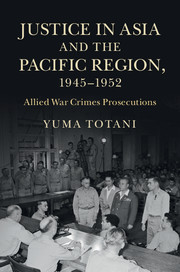Conclusion
Published online by Cambridge University Press: 05 February 2015
Summary
This book has explored the two international criminal proceedings that followed the Tokyo Trial and twelve other high-profile war crimes trials held by American, Australian, British, and Philippine authorities in the Asia-Pacific region. The goal has been to tap into the rich oral and documentary history of the war as contained in the trial records and produce a war narrative that aims at exploring the nexus between military operations and the occurrence of war crimes. This book has also elucidated the Allied courts’ cumulative findings on the circumstances of war crimes, the Japanese system of command and control, and applicable theories of liability. Where relevant, the foregoing chapters have touched on the political significance of the trials in relation to the larger context of Asian decolonization.
What conclusions are we now to draw from these case studies? What kind of justice can one say has been rendered at these trials, and for whom? Should it be deemed “victor’s justice,” or should different kinds of historical assessment be made? How might one also assess the jurisprudential legacy of the fourteen cases analyzed in this book? Did they help clarify the issues of Japanese organizational and individual responsibility for war crimes, or did they rather confuse us by offering diverse and at times mutually conflicting decisions? Above all, what benefit is there to unearthing the records of historical war crimes trials, and that is, after the passage of seven decades since the end of World War II? Does such exploration help generate new knowledge about the war and the history of international criminal justice? Or does it only reveal inconvenient truths about Japanese wartime military violence and shortcomings of Allied justice, thereby reopening old wounds rather than bringing closure to them?
- Type
- Chapter
- Information
- Justice in Asia and the Pacific Region, 1945–1952Allied War Crimes Prosecutions, pp. 179 - 190Publisher: Cambridge University PressPrint publication year: 2015



